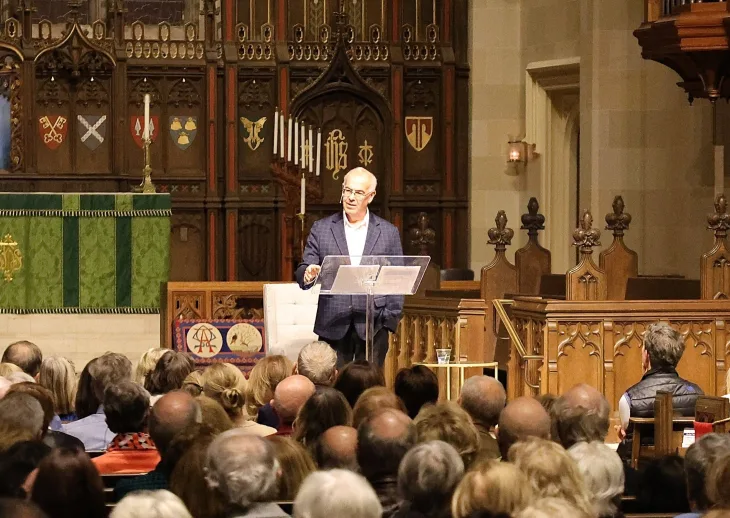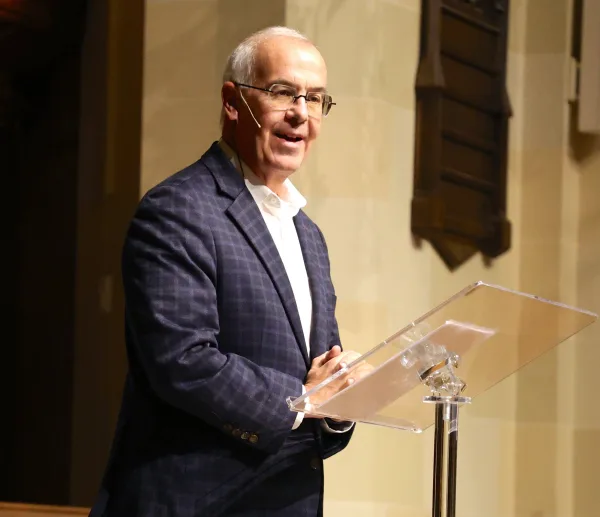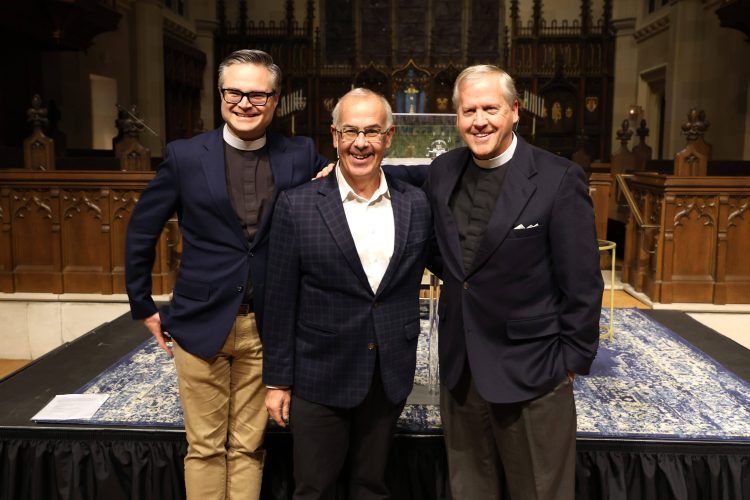
By Anne W. Semmes
Two churches in town, Christ Church and St Barnabas partner together to bring impressive speakers to address arresting subjects beneath the banner of “Courage and Faith.” Last Wednesday evening 500 attendees filled Christ Church to hear much-in-demand New York Times columnist, PBS Newshour commentator, and bestselling author David Brooks address the subject of “How America Recovers.” His latest book, “How to Know a Person: The Art of Seeing Others” delves into human character. Washington based, he’s taught at Yale, Duke, and now University of Chicago.
He began with sharing his faith path, introducing his humor. Growing up Jewish in New York City, the “household motto was think Yiddish, act British…so my parents sent me to an Episcopalian school called Grace Church School in Lower Manhattan…. the choir was about 30 percent Jewish…but we wouldn’t sing the word Jesus to square with our religion.”
But faith would be left far behind in his life until that “hard time” in his adult life with a divorce, with his kids off to college. He would come across the writings of author, preacher, theologian Frederick Bruechner, who wrote, “When you’re in moments of pain, you can either be broken – or broken open” which he chose that would open the door to faith. “And now,” he noted, “I’m a happy guy, happily married.”
It was when he “hit 50,” that he was influenced by a friend at Yale Divinity School, Christian Wiman, author of “My Bright Abyss: Meditation of a Modern Believer,” Brooks called “one of the greatest books of Christian apologetics.” Wiman had written that “his old materialistic worldview did not accord with the transcendence of the reality he experienced.” Brooks was thus inspired to fill his library with Christian books, “joining the Christian church in 2013.”
The American Dream
Brooks addressed the topic of his talk, “How America Recovers.” “Charles de Gaulle began his memoir of World War II with… ‘All my life I’ve had a certain idea about France,’ and all my life I’ve had a certain idea about America epitomized by something that happened to me maybe 20 years ago but is still vivid in my mind.” He was asked to be a judge for the Boys and Girls Clubs choosing every year “a young man or woman aged 18 or so, who best exemplifies what boys’ and girls’ clubs can do for young people in this country.” The winner would be “a young woman who’s had the most wrenching upbringing of abuse, of violence, of trauma.” But most winsome was she, “When we started asking about her future…suddenly her eyes lifted and a huge smile came across her face, a smile not only done with the mouth but the whole body. And she started talking about her dreams and visions and plans for her life.”
And that fire in her, Brooks told, “Is what America is all about. That gleam in the eye that says, I’m going to do big things…It’s the gleam of social mobility, what we used to call the American dream…And so my whole political philosophy is how do we create a society in which every kid gets to experience the dream. And if you saw the musical ‘Hamilton’ about Alexander Hamilton, my personal hero, he’s a Puerto Rican hip hop star from Washington Heights.” But that’s not what Brooks sees in America today. “Seventy percent of Americans say they’ve given up on the American dream. “
What Brooks sees is the rise in populism. “Populism is rising across Western Europe, across Latin America, in Japan, in Asia. Very few times in history of the last 200 years have we seen such a strong historical tide… and it’s very hard to reverse a global tide. Some people say you can fight it. Some people say just try to survive it because the tide shifts. But the source of the tide, in my view, is a loss of faith around the world… I think we’re in the middle of some sort of emotional, psychological and spiritual crisis. And you can see it… in the rising depression rates… We’ve just become sadder as a society, and when you become sadder, you become meaner because you perceive yourself being ignored and invisible to society and you feel threatened, and you want to lash out…. gun violence, hate crimes, look at the internet.”

A cultural shift
What was needed was “a cultural shift.” “Somehow, we have to renegotiate America’s story, so people recover what’s deep inside them. Believe me, it’s still there. If you ask people do you want more diversity in society or less, huge majorities want more diversity…Huge majority say immigrants are great for America. Do you want America to champion democracy around the world? Huge majority say yes. If you ask people what’s makes an American, it’s about work. It’s about mobility…What’s at the bottom of the ranking – being a Christian people don’t think is an essential to being American.”
The people “are still there in their core values, but they have not been talked to, and they have not seen a political party, frankly, the Democratic party that does that…This can happen and I’m confident it will. It’s happened so many times in American history that we’ve come back, and I just think we’re in the process, but we need to go through the steps.”
During Covid Brooks had read Harvard political scientist Samuel Huntington’s book, “American Politics – The Promise of Disharmony,” wherein Huntington found, “every 60 years American seems to go through a moral convulsion…when people get disgusted with established power.” Thus, beginning in 1770 with the American revolution and moving forward, “if the pattern holds some time around 2020 America will go through another moral convulsion. Well done Professor Huntingon!”
Need for humanity
Brooks ended his history-filled talk with a remembrance of a night two months after October 7. He’s in a bar in a hotel – he travels a lot. He’s scrolling through Twitter, seeing those images from the Middle East “and they were all brutal,” when up popped a video appearing to be made in the early sixties. “James Baldwin, the novelist is being interviewed, and he says to the interviewer, ‘Obviously there’s not as much humanity as one would like to see, but there’s enough. There’s more than you would think.” Baldwin continues, “What you’ve got to remember is when you walk down the street, every person you see, you could be that person, and that person could be you.”
“James Baldwin had every right to be bitter about humanity in America,” told Brooks. “And often frankly in his writing, he was angry and bitter, but he was still able to make this most humanistic of statements that every person, that person could be you. That’s the essential human connection. And the phrase that leapt out to me as I’m sitting there on my phone was defiant humanism – that even in the case of a hailstorm of mistreatment, Baldwin was defiantly humanistic. And it seems to me that’s what we’re called upon to be today.”
In the following Q and A with Brooks, what leapt out was this question. “David, thank you very much. I totally agree with you about the lack of leadership of any movement at this point in time… I’ve been to two No King rallies in Washington… It’s just not happening. Will you please stick your neck out. We will all march with you. Will you please start getting the movement going down the right path. Now is the return of democracy, the return of humanity… Can you help lead that?”
“I’ve written articles about a movement,” Brooks responded, “but I’m not particularly a movement guy… I don’t have what leaders really need. My lane is writing and advocating, so I advocate.”



